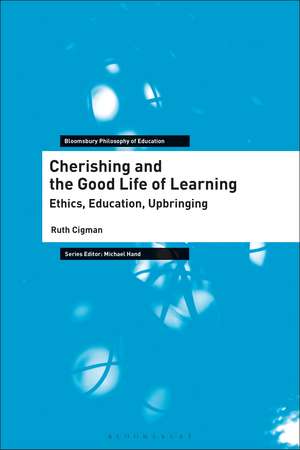Cherishing and the Good Life of Learning: Ethics, Education, Upbringing: Bloomsbury Philosophy of Education
Autor Dr Ruth Cigmanen Limba Engleză Paperback – 19 feb 2020
| Toate formatele și edițiile | Preț | Express |
|---|---|---|
| Paperback (1) | 223.67 lei 6-8 săpt. | |
| Bloomsbury Publishing – 19 feb 2020 | 223.67 lei 6-8 săpt. | |
| Hardback (1) | 773.23 lei 6-8 săpt. | |
| Bloomsbury Publishing – 8 aug 2018 | 773.23 lei 6-8 săpt. |
Preț: 223.67 lei
Preț vechi: 288.31 lei
-22% Nou
Puncte Express: 336
Preț estimativ în valută:
42.80€ • 44.42$ • 35.78£
42.80€ • 44.42$ • 35.78£
Carte tipărită la comandă
Livrare economică 18 martie-01 aprilie
Preluare comenzi: 021 569.72.76
Specificații
ISBN-13: 9781350151635
ISBN-10: 1350151637
Pagini: 224
Dimensiuni: 156 x 234 mm
Greutate: 0.32 kg
Editura: Bloomsbury Publishing
Colecția Bloomsbury Academic
Seria Bloomsbury Philosophy of Education
Locul publicării:London, United Kingdom
ISBN-10: 1350151637
Pagini: 224
Dimensiuni: 156 x 234 mm
Greutate: 0.32 kg
Editura: Bloomsbury Publishing
Colecția Bloomsbury Academic
Seria Bloomsbury Philosophy of Education
Locul publicării:London, United Kingdom
Caracteristici
Explores the 'roots of human emotion', theoretically inaccessible to Aristotle but not to Winnicott, whose work paves the way for an ethic of cherishing
Notă biografică
Ruth Cigman is Honorary Senior Research Associate in Philosophy of Education at IOE, UCL's Faculty of Education and Society, University College London, UK.
Cuprins
Series Editor's ForewordAcknowledgementsIntroductionPart I: We Need to Talk About Children1. 1. A Sense of Moral Crisis2. 2. Ministering to the Good Part II: Enhancing Children3. 3. Should We Try to Make Children Happy? 4. 4. Should We Equip Children for Twenty-First-Century Life? 5. 5. Should we Promote Flourishing through Virtue? 6. 6. Should we Foster Respect through Inclusion? Part III: Cherishing Children7. 7. Humanness and the Difficulty of Reality 8. 8. Aristotle and the Transformation of Emotion9. 9. An Ethic of CherishingBibliographyIndex
Recenzii
Ruth Cigman develops a style of thinking that attempts to get to the pith of what may be most at stake for children inside and outside classrooms. Her book will be of special interest to teachers and parents who are sensitive to the singularity of. children and the daunting difficulty that their lives often present to themselves and to others. Cigman deftly exposes the misplaced confidence driving several currently favoured reform agendas. And she shows why helping young people to thrive may require us not to ward off troubling intuitions but (in Iris Murdoch's words, which she quotes) to 'complicate, alter and deepen' them. This is a rare and welcome kind of philosophical writing. engaged and engaging, deeply humane and vividly persuasive.
At a time when 'caring' has become the name of an activity, with no emotional content, it is useful to have the concept of cherishing introduced, as that which should define the relation between teacher and pupil . Ruth Cigman powerfully and often movingly argues that nothing less will do. Her book . is highly original, in being centred on the 'conversation' which she regards as the essence of teaching.
I often disagree with the author, but there is no questioning her wit, the lucidity of her writing and the originality of her insights. An exhilarating read, unmissable for all lovers of educational philosophy.
At a time when 'caring' has become the name of an activity, with no emotional content, it is useful to have the concept of cherishing introduced, as that which should define the relation between teacher and pupil . Ruth Cigman powerfully and often movingly argues that nothing less will do. Her book . is highly original, in being centred on the 'conversation' which she regards as the essence of teaching.
I often disagree with the author, but there is no questioning her wit, the lucidity of her writing and the originality of her insights. An exhilarating read, unmissable for all lovers of educational philosophy.






